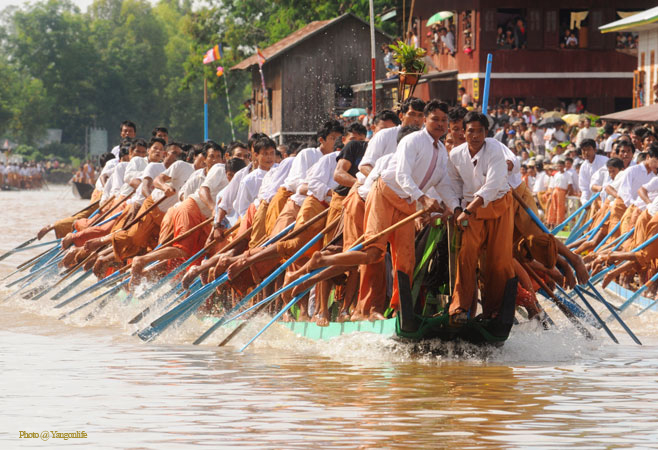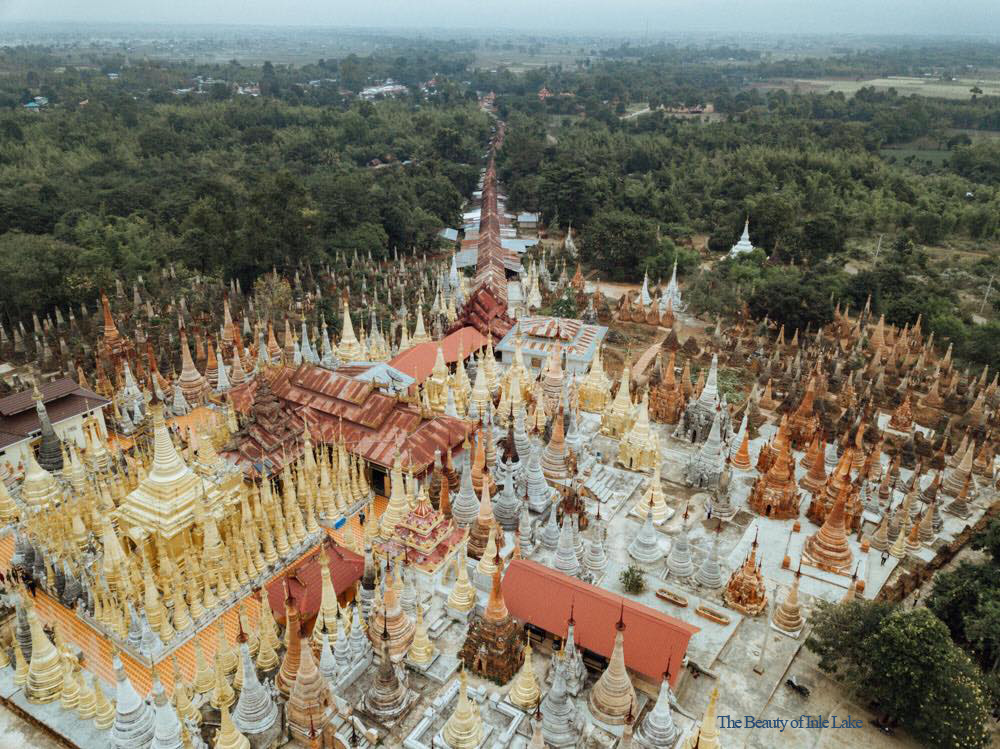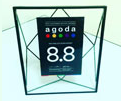Near By Attraction

Phaung Daw Oo Pagoda Festival
Phaung Daw Oo Pagoda Festival is the biggest annual event in Inle Lake, the holiest religious site in Shan State, Myanmar. In this year, will be held between 29 September and 16 October for 18 days. Both locals and foreign visitors come to visit this traditional festival. Phaung Daw Oo Pagoda is the most highly revered monastery in inle lake area. It houses five ancient images of the Buddha that are completely covered in golf leaf.
During the festival, in a procession of boats four of the five images of the Buddha are removed from their shrine in the Phaung Daw Oo pagoda and placed on the Royal Karaweik barge. At the front of the boat is the large gilded head of a Karaweik bird; at the back is the gilded tail of the mythological bird. The four images of the Buddha are kept in an ornate pavilion topped with three multi-tiered Burmese Style Pyatthat roofs in the center of the boat. The barge is towed by long boats manned by up to a hundred leg rowers in colorful costumes. The Royal barge stops at 14 villages around Inle lake, where the images stay in the main monastery for one night.
Besides the Phaung Daw Oo Pagoda, the Indein Village, Nga Phe Kyaung Monastery and floating villages are also famous spots in Inle Lake region. Inle lake is worth the visit to take the time to see the Intha living in the most beautiful natural lake environment.
This year 2019, the date is set for September 29 – October 16.
ref:www.asiantour-myanmar.com


The lake, which measures 22 km long by 10 km wide, and sits in a valley between two mountain ranges, feels like a different world to the rest of Myanmar: in villages and towns across the lake, wooden houses are built high on stilts and fishermen steer their one-man boats with a unique rowing style, wrapping one leg around their oar.
In many places the authentic life on the lake shines through, and it is so large – and the sites sufficiently spread out – that, outside of the villages and markets, it rarely feels crowded.”

It lies in Nampan Village. Nyaung Shwe Township. southern Shan State. It was one of the 84000 pagodas built by Thiri Dhamma Thawka the famous king. It was then known as Innphaya Pagoda. King Anawrahta eventually arrived in Inlay and had to rebuild the pagoda as it was left only as the foot of the original pagoda. He consecrated eight more relics of Buddha there.
When King Alaungsithu visited the place. he saw the Alodaw Pauk Pagoda. He made a vow on the jewelled bowl turned down and in the bowl came the relics of Buddha.”

It´s very pleasant to see the farmers way of life on the lake. Long boats transporting villagers, people fishing, harvesting. Small villages along the way with the backround of the beautiful Shan mountains, a very nice and peaceful experience.”

Pottery has a long tradition in Myanmar. Like some villages that produce terracotta pots in lower Myanmar, a few villages on Inlay Lake, such as Kyaut Taing, have underground kilns. Pits are dug with space in front and some steps for the potters to carry in and stack the pots, with the smoke hole at the back screened with a wind-breaking mat.”

The Shwe Yan Pyay Monastery, just outside Nyaung Shwe, is a fascinating wooden monastery built in the early 19th Century. It is a very interesting red painted teak wood building with oval windows, and richly decorated with mosaics and golden ornaments.”
The Museum in Nyaungshwe Inle Lake, Myanmar (Burma) is located in the former palace of the last Shan, Sao Shwe Thaike, who became the first president of Myanmar in 1948.
The large brick and teak mansion itself worth a visit, especially the large throne and audience hall in the north wing of the palace.”
Unique Leg Rower’s Racing can be seen in Inlay Lake, Southern Shan State of Myanmar, especially during the Inlay Phaung Daw Oo Pagoda festival, as one of the attractive events in this region.”

A wonderful watery world of floating gardens, stilted villages and crumbling stupas, Inle Lake is an absolute must. Mountains tumble down towards the lakeshore, blurring the distinction between heaven and earth.
For many travellers, Inle is heaven on earth, a place to while away the days canoeing, cycling and walking through the lush countryside. The Intha people are famous for their leg rowing, although these days many just turn it on for the tourists.
There is even a monastery where meditating monks have taught the cats to jump – that’s enlightenment for you. Inle deserves to be savoured, not rushed, and many travellers end up staying for longer than they expected.”
Khaung Daing Hot Spring, located 27 miles (43km) west of Taunggyi, the capital of Shan State of Myanmar is famous for visitors to take pleasure in the beautiful landscape around it.”
The native people, In-Thars, grow vegetables on floating islands which are collection of floating weed and water hyacinth. These floating islands can be cut, dragged by boats and ever be sold like a piece of land. Floating gardens can be found mostly in Kaylar, Inchan and Zayatgyi villages.”
A Five Day Market is one of the attractive tourist experiences in Shan State where the different ethnic nationals sell their daily farm products like vegetables, fish, flowers, fruits and so on. This kind of shopping is unique to this place and naturally brings pleasure to many shoppers from the area and from far.”
It is located 26 miles (42km) from Taunggyi, the capital city of Shan State; and 10 miles (16km) from Hopone city. It is a natural limestone cave at 1800 meter above sea level.
At the heart of Hten San Cave lies one of its great wonders, Hten San Cave Located in the central uplands of Shan State, this breathtakingly beautiful, limestone cavern is a testament to natural’s mastery. Flowing streams, deep pools of crystal clear water and towering columns characterize this living cave. Gaze in wonder at the while flow stones and in awe at the beauty of the nature which adorn the cave. Be sure to make Hten San Cave your first stop while in Taungyi.”

Indein is one of the small villages of Inle Lake located on the western bank of the lake. A Buddha image has enshrined at a whitewashed stupa. which is on the summit of a hill. Below the stupa around the hill are cluster of hundreds of ancient stupas most are ruins overgrown with bushes. The pagoda hill is quiet and calm. One could feel the pleasant cool breeze with the sweet rings of the bells hanging at the umbrella of the stupa. Mesmerizing view from pagoda hill release the fatigue and refresh everybody who ascend to the peak.
This mysterious place is at the end of the marvellous Indein creek. which connected with Inle Lake just after the Phaung Daw Oo Pagoda. The creek is narrow with many twist and turns. Since the both sides are paddy fields you can see the farmers ploughing and harrowing by water buffaloes. At the lunch time while groups of farmers having lunch the water buffaloes enjoy themselves dipping in the creek. At many places in the creek the farmers dam up the water by bamboo barriers to irrigate the paddy fields. Indein water is not only useful for irrigation also for bathing and washing cloths. It is compulsory to see Novice monks. buffalo boys and village girls wash and swim in the creek.”
One of the Asia’s largest and most spectacular ancient monuments is a wonderful Pagoda named Kakku. It contains over 2.000 stupas with origins dating back many centuries. Its exists not only as an outstanding example of tradition art and architecture but also as a testament to the religious devotion of one of Myanmar’s many ethnic minorities. the Pa-Oh. For many centuries. the Pa-Oh has lived in peace. cultivating their land and devoting much of their energy and limited wealth to creating monasteries and pagodas.
Kakku is about 33 miles from Taunggyi. It will take about 3 hours drive by car. Kakku is located in the Shan State. Kakku is in the territory of Pa-Oh people. There are over 2000 stupas packed closely together in ranks and covering an area perhaps a square kilometer. The main stupa is around 40 meters high. the mass of the spire surrounding it uniformly. But each one is an individual masterpiece. The particular remarkable about the whole site is its good state of preservation. Originally each one must have been topped by a gilded metal hti. the multi tiered umbrella-like feature. which is typical of Myanmar Pagodas. Many of these are tilted on fallen. External rendering of mortar and stucco has crumbled away on others. exposing the brick core while trees have established themselves in a few. threatening to split them apart. But so much of the originals still exist that this site must be free of the destructive force of earthquakes. which have periodically ravaged many of the Myanmar’s other monuments.
External decoration on many of the stupas is simple. almost sparse. the builders. having concentrated on pure grace and form for effect. but other features elaborate decoration. Traditional motifs weave intricate patterns of arabesques and stems. to create a delicate tracery of the highest artistic merit.
Even more fascinating are the many figures. carved in stucco and apparently originally brightly painted. which adorn corner or pay silent homage beside the niches in the base. many of which still contain antique Buddha images. Angels. musicians. dancers- all created with consummate skill. The remoteness of the site and reluctance of the local people allow visitors has helped to preserve its sculptures and artistic treasures to a degree. unknown in other ancient monuments in Myanmar. Kakku is a priceless piece of mankind heritage. a truly splendid example of the creative talent of remarkable people. It will take about 3 hours drive by car.”
Fly into Heho and take a taxi an hour to the resort. From the hotel you take a boat around the lake to visit shops, restaurants and the many wonderful shrines and temples. The whole area is worthwhile for the adventuresome mobile couple to visit this fascinating, unique and scenic place.
RESORT ADDRESS
Mobile : +(95-9) 519 7770, 762 166 160, 762 166 170
YANGON SALES & RESERVATION OFFICE
Mobile : +(95-9) 5197772, 5197774
Email : [email protected],
[email protected],
[email protected]




